Text
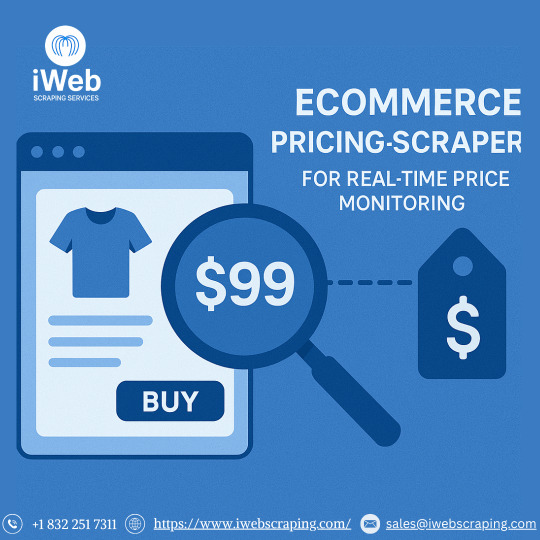
E-commerce Pricing Scraper for Real-Time Price Monitoring
iWeb Scraping Services offers e-commerce pricing scraper solutions to help businesses track real-time price changes, monitor competitor strategies, and extract structured product data at scale. Our e-commerce pricing data scraper enables accurate pricing analysis across multiple online stores, boosting strategic planning and revenue management. Get updated data feeds without technical hassles.
0 notes
Text
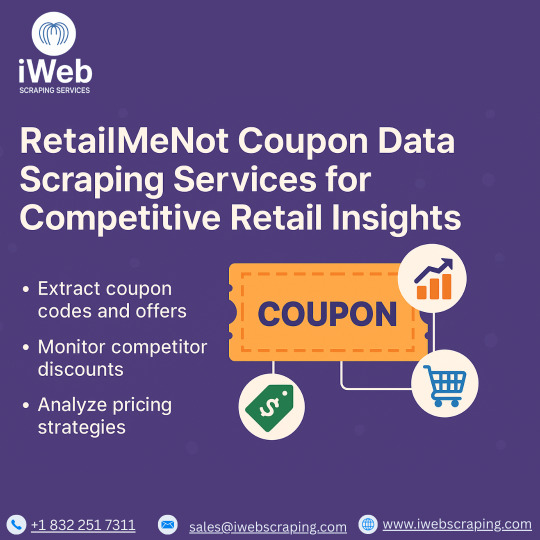
RetailMeNot Coupon Data Scraping Services for Competitive Retail Insights
Access structured coupon and promo code data from RetailMeNot using reliable scraping. collect Data like discount coupon types, brand percentages, expiration dates, categories, and user ratings. With clean, organized datasets, businesses can monitor competitor offers, analyze pricing strategies, and track seasonal deal trends effectively.
RetailMeNot coupon data scraping allows e-commerce platforms, deal aggregators, and digital marketing firms to stay revised with real-time retail intelligence. Specify which brands offer frequent discounts, understand average savings per category, and gather data for targeted campaigns or dynamic pricing models. Coupon data scraping allows e-commerce platforms, deal aggregators, and digital marketing firms to stay revised with real-time retail intelligence. Specify which brands offer frequent discounts, understand average savings per category, and gather data for targeted campaigns or dynamic pricing models.
0 notes
Text
Restaurant Menu Scraping Services—Extract Food Menu Data
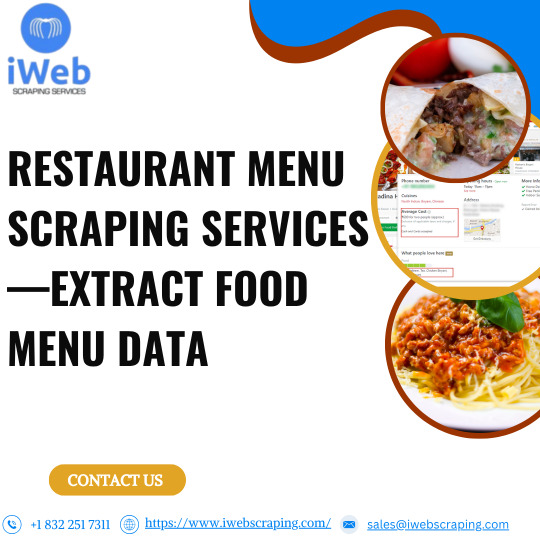
Access detailed restaurant menu data effortlessly with our professional restaurant menu scraping services. Whether you’re building a food delivery app, conducting market research, or managing a restaurant aggregator platform, we help extract structured data directly from restaurant websites. Gather essential information such as dish names, ingredients, pricing, dietary tags, categories, and images — all in a clean, ready-to-use format.
Our automated solutions ensure accurate data collection across thousands of listings, helping you keep menus updated with the latest entries and pricing. From multi-location franchises to local diners, our scraping service supports a wide variety of restaurant platforms. With real-time updates and reliable output formats like CSV, JSON, or Excel, your team can make smarter decisions, faster.
Leverage data to track food trends, analyze competitors, or enhance your digital menu offerings with precision. iWeb scraping ensures secure and efficient extraction — no manual effort needed. Scale your food-related operations confidently with structured, reliable restaurant menu data.
0 notes
Text
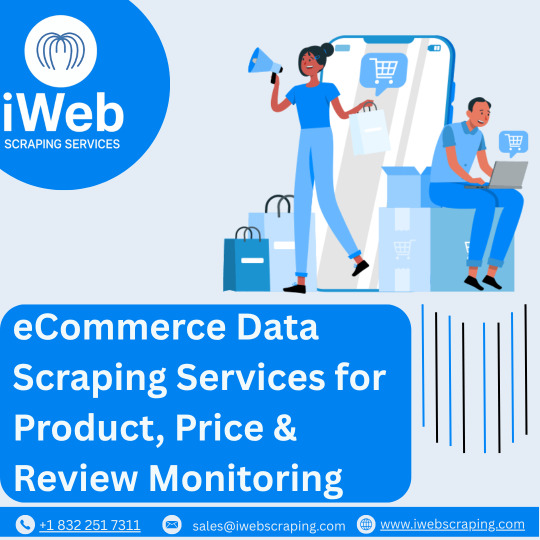
eCommerce Data Scraping Services for Product, Price & Review Monitoring
Product research and pricing analysis with professional eCommerce data scraping services from iWeb Scraping. We support companies collect real-time & trustworthy data from marketplaces to stay ahead of trends and competitors. Capture detailed insights, including product names, categories, pricing, ratings, reviews, stock availability, and seller data, across various e-commerce platforms.
0 notes
Text
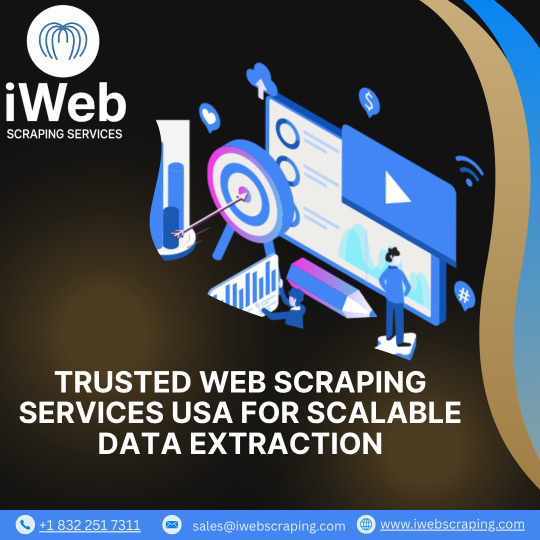
Trusted Web Scraping Services USA for Scalable Data Extraction
iWeb Scraping is an efficient web scraping services used to manage large-scale, structured data from websites & APIs across different industries. Various platform helps companies collect crucial data like product details, pricing, reviews, Product Listing, stock levels, location data, job listings, and more. Whether for competitor analysis, lead generation, or price tracking, iWeb Scraping supports data extraction from e-commerce, travel, automotive, real estate, and financial platforms. With components like automated scheduling, CAPTCHA handling, and geo-based IP rotation, the services are built to ensure speed, accuracy, and reliability. Data is provided in formats including CSV, Excel, JSON, or through API integration based on user selection. iWeb Scraping helps companies save time and reduce manual effort by delivering automated, scalable scraping infrastructure.
0 notes
Text
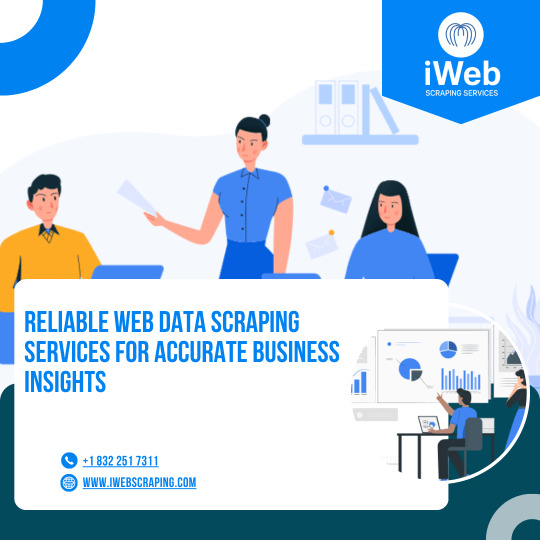
Reliable Web Data Scraping Services for Accurate Business Insights
Access up-to-date, organized data with iWeb Scraping’s reliable web data scraping services. From product catalogs and pricing details to client feedback and vendor information, companies can collect essential data from e-commerce websites, travel directories, real estate portals, job listings, financial networks, automotive sources, and more. iWeb scraping provides clean, scalable, reliable, and customizable data solutions to support analytics, competitor tracking, and decision-making processes. Whether for market research, price monitoring, or lead generation, our scraping infrastructure supports large-scale extraction with speed and accuracy. Data structures are provided as per your need—Excel, CSV, JSON, or APIs. The platform also offers IP rotation, geo-targeting, and CAPTCHA handling for uninterrupted delivery. With iWeb Scraping, businesses can automate data collection while maintaining accuracy and reliability across various digital sources. To know more about how your business can benefit from efficient data scraping, visit https://www.iwebscraping.com/. Get the data that drives smarter decisions—on time and at scale.
0 notes
Text
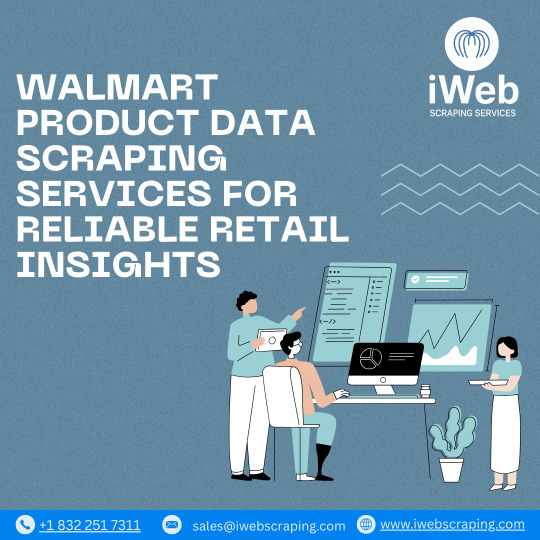
Walmart Product Data Scraping Services for Reliable Retail Insights
Access real and structured retail data with our Walmart product data scraping services. iWeb Scraping allows businesses to extract key product data, including pricing, stock availability, product reports, and reviews, directly from Walmart’s listings. Whether you need real-time data or scheduled extractions, our solutions support bulk data scraping with high accuracy and speed. This advantage is ideal for e-commerce analytics, competitor research, dynamic pricing models, and marketplace performance tracking.
To research scalable Walmart scraping services that simplify access to valuable product intelligence. Stay updated and competitive by integrating accurate Walmart data into your internal systems.
0 notes
Text
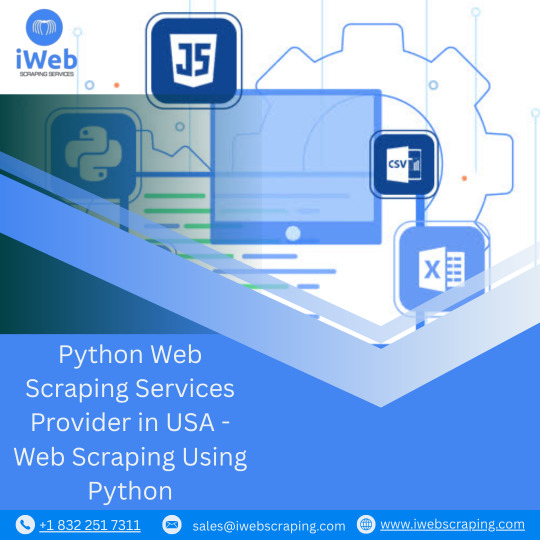
Python Web Scraping Services Provider in USA - Web Scraping Using Python
You’ve perhaps heard about how enormous Python is. However, other programming languages are also excellent, so why should you choose Python for web data scraping over the other languages? So, here is the list of Python features that make it more appropriate for web scraping.
Have you heard about Python web scraping and what it does for you? Web scraping with Python is a method for collecting data from webpages using Python technology. It does the routine task of searching and downloading pages or collecting content and storing it in a particular data format. iWeb Scraping provides the best web scraping and data mining services provider in the USA using Python technology that makes your task of scraping the website quickly easy.
You’ve perhaps heard about how enormous Python is. However, other programming languages are also excellent, so why should you choose Python for web scraping over the other languages? So, here is the list of Python features that make it more appropriate for web scraping.
0 notes
Text

Smart Competitive Pricing Intelligence for Strategic Business Advantage
iweb scraping services Competitive pricing intelligence gives businesses permission to remain up-to-date with market changes through monitoring competitor pricing in real time. This gives business permission to follow trends, factor in gaps in pricing, and modify offers according to information-based strategies rather than hypotheses.Whether in e-commerce, retail, or manufacturing, using precise pricing intelligence supports wiser decision-making. Pricing intelligence is critical since retail pricing is competitive, rapid, and changing wherein correct or incorrect prices directly affect profitability and sales.
0 notes
Text
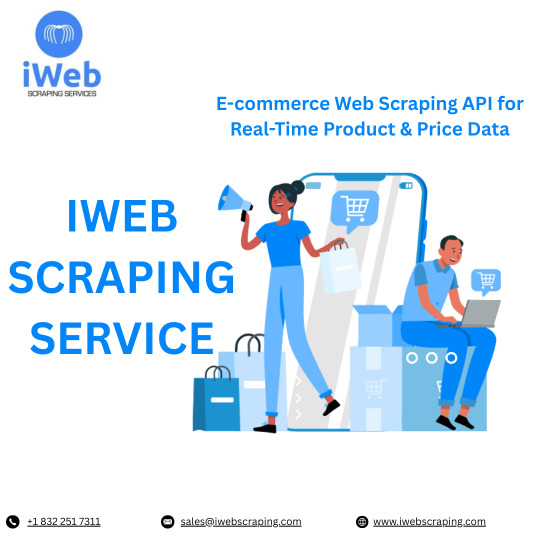
E-commerce Web Scraping API for Accurate Product & Pricing Insights
Access structured e-commerce data efficiently with a robust web scraping API for online stores, marketplaces, and retail platforms. This API helps collect data on product listings, prices, reviews, stock availability, and seller details from top e-commerce sites. Ideal for businesses monitoring competitors, following trends, or managing records, it provides consistent and correct results. Built to scale, the service supports high-volume requests and delivers results in easy-to-integrate formats like JSON or CSV. Whether you need data from Amazon, eBay, or Walmart. iWeb Scraping provides unique e-commerce data scraping services. Learn more about the service components and pricing by visiting iWebScraping E-commerce Data Services.
0 notes
Text
0 notes
Text
Section 8 Housing Listings Scraping | Scrape 8 Housing Data
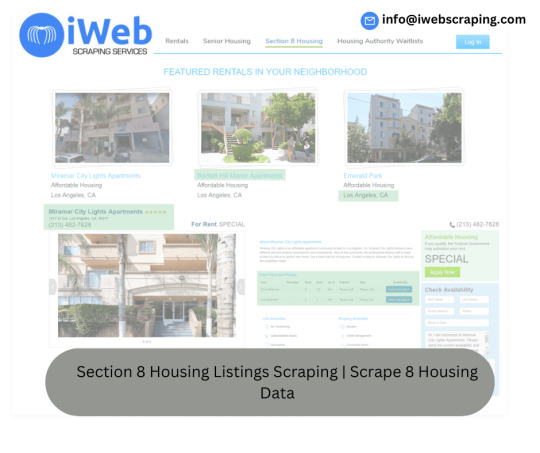
In an era where technology is revolutionizing access to information, one area that stands to benefit significantly is the affordable housing sector. Specifically, Section 8 housing, a crucial component of the United States Department of Housing and Urban Development (HUD) rental assistance programs, can harness data scraping techniques to make housing more accessible to eligible low-income families. In this blog, we’ll explore the significance of scraping Section 8 housing listings, its potential benefits, and the ethical considerations involved.
What is Section 8 Housing?
Section 8, also known as the Housing Choice Voucher Program, is designed to help very low-income families, the elderly, and the disabled afford decent, safe, and sanitary housing in the private market. Through this program, HUD provides subsidies to landlords who rent to eligible tenants, enabling these tenants to pay a reduced rent based on their income. The program's efficacy largely depends on the accessibility and availability of housing information to potential tenants.
The Need for Scraping Section 8 Listings
Centralized Information Repository: Section 8 housing listings are often scattered across multiple platforms, including government websites, private landlord websites, and real estate portals. Scraping can centralize this information, making it easier for applicants to find and compare different housing options.
Timely Updates: Housing availability can change rapidly, with new listings appearing and old ones disappearing frequently. Automated scraping tools can provide real-time updates to users, ensuring they don’t miss out on any opportunities.
Customized Search Options: Scraping can enable users to filter housing options based on specific criteria such as location, size, and amenities, tailored to their needs and preferences.
How Does Section 8 Housing Scraping Work?
Data Collection: Web scraping tools systematically browse through various websites to collect data on available Section 8 housing. This includes details like location, size, rent, and contact information.
Data Processing: Once collected, the data is cleaned and organized into a structured format. This step is crucial as it ensures the accuracy and reliability of the information provided to users.
Integration with User Interface: The processed data is then integrated into a user-friendly platform where potential tenants can easily search and filter through the listings.
Benefits of Section 8 Housing Listings Scraping
Increased Accessibility: By aggregating listings from multiple sources, scraping tools make it easier for low-income families to access a wide range of housing options without visiting numerous websites.
Efficiency: Users can quickly compare different listings and make informed decisions without spending hours sifting through outdated or irrelevant information.
Cost-Effectiveness: For organizations that assist individuals in finding Section 8 housing, scraping reduces the manual effort and costs associated with searching for and compiling housing data.
Ethical and Legal Considerations
While the benefits of scraping Section 8 housing listings are evident, it’s crucial to consider the ethical and legal implications of this technology.
Compliance with Terms of Service: Many websites have terms of service that prohibit data scraping. It’s essential to respect these terms and seek permission when necessary.
Privacy Concerns: Scraping should be conducted in a way that respects the privacy of landlords and tenants. Personal information should be handled with care and used only for its intended purpose.
Data Accuracy and Verification: Ensuring the accuracy of the scraped data is paramount. Users rely on this information to make critical housing decisions, so it's crucial to provide verified and up-to-date information.
Conclusion
Scraping Section 8 housing listings offers a powerful tool to enhance the accessibility and efficiency of the affordable housing market. By centralizing and streamlining housing information, scraping tools can play a significant role in helping low-income families find suitable homes. However, it's important to navigate the ethical and legal landscape carefully to ensure that this technology benefits all stakeholders involved. As we continue to innovate in this space, the ultimate goal remains clear: to provide fair and equal housing opportunities for all.
0 notes
Text
0 notes
Text
Vacation Rental Website Data Scraping | Scrape Vacation Rental Website Data
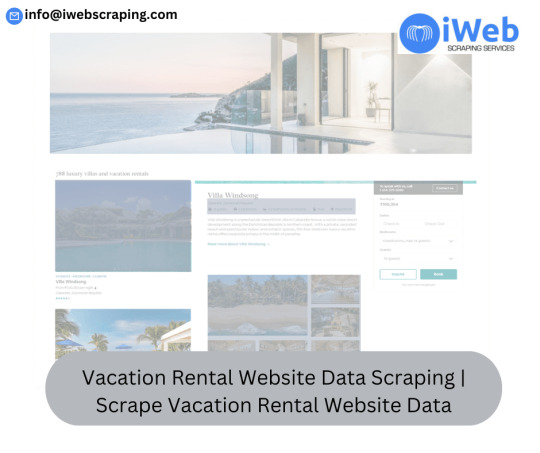
In the ever-evolving landscape of the vacation rental market, having access to real-time, accurate, and comprehensive data is crucial for businesses looking to gain a competitive edge. Whether you are a property manager, travel agency, or a startup in the hospitality industry, scraping data from vacation rental websites can provide you with invaluable insights. This blog delves into the concept of vacation rental website data scraping, its importance, and how it can be leveraged to enhance your business operations.
What is Vacation Rental Website Data Scraping?
Vacation rental website data scraping involves the automated extraction of data from vacation rental platforms such as Airbnb, Vrbo, Booking.com, and others. This data can include a wide range of information, such as property listings, pricing, availability, reviews, host details, and more. By using web scraping tools or services, businesses can collect this data on a large scale, allowing them to analyze trends, monitor competition, and make informed decisions.
Why is Data Scraping Important for the Vacation Rental Industry?
Competitive Pricing Analysis: One of the primary reasons businesses scrape vacation rental websites is to monitor pricing strategies used by competitors. By analyzing the pricing data of similar properties in the same location, you can adjust your rates to stay competitive or identify opportunities to increase your prices during peak seasons.
Market Trend Analysis: Data scraping allows you to track market trends over time. By analyzing historical data on bookings, occupancy rates, and customer preferences, you can identify emerging trends and adjust your business strategies accordingly. This insight can be particularly valuable for making decisions about property investments or marketing campaigns.
Inventory Management: For property managers and owners, understanding the supply side of the market is crucial. Scraping data on the number of available listings, their features, and their occupancy rates can help you optimize your inventory. For example, you can identify underperforming properties and take corrective actions such as renovations or targeted marketing.
Customer Sentiment Analysis: Reviews and ratings on vacation rental platforms provide a wealth of information about customer satisfaction. By scraping and analyzing this data, you can identify common pain points or areas where your service excels. This feedback can be used to improve your offerings and enhance the guest experience.
Lead Generation: For travel agencies or vacation rental startups, scraping contact details and other relevant information from vacation rental websites can help generate leads. This data can be used for targeted marketing campaigns, helping you reach potential customers who are already interested in vacation rentals.
Ethical Considerations and Legal Implications
While data scraping offers numerous benefits, it’s important to be aware of the ethical and legal implications. Vacation rental websites often have terms of service that prohibit or restrict scraping activities. Violating these terms can lead to legal consequences, including lawsuits or being banned from the platform. To mitigate risks, it’s advisable to:
Seek Permission: Whenever possible, seek permission from the website owner before scraping data. Some platforms offer APIs that provide access to data in a more controlled and legal manner.
Respect Robots.txt: Many websites use a robots.txt file to communicate which parts of the site can be crawled by web scrapers. Ensure your scraping activities respect these guidelines.
Use Data Responsibly: Avoid using scraped data in ways that could harm the website or its users, such as spamming or creating fake listings. Responsible use of data helps maintain ethical standards and builds trust with your audience.
How to Get Started with Vacation Rental Data Scraping
If you’re new to data scraping, here’s a simple guide to get you started:
Choose a Scraping Tool: There are various scraping tools available, ranging from easy-to-use platforms like Octoparse and ParseHub to more advanced solutions like Scrapy and Beautiful Soup. Choose a tool that matches your technical expertise and requirements.
Identify the Data You Need: Before you start scraping, clearly define the data points you need. This could include property details, pricing, availability, reviews, etc. Having a clear plan will make your scraping efforts more efficient.
Start Small: Begin with a small-scale scrape to test your setup and ensure that you’re collecting the data you need. Once you’re confident, you can scale up your scraping efforts.
Analyze the Data: After collecting the data, use analytical tools like Excel, Google Sheets, or more advanced platforms like Tableau or Power BI to analyze and visualize the data. This will help you derive actionable insights.
Stay Updated: The vacation rental market is dynamic, with prices and availability changing frequently. Regularly updating your scraped data ensures that your insights remain relevant and actionable.
Conclusion
Vacation rental website data scraping is a powerful tool that can provide businesses with a wealth of information to drive growth and innovation. From competitive pricing analysis to customer sentiment insights, the applications are vast. However, it’s essential to approach data scraping ethically and legally to avoid potential pitfalls. By leveraging the right tools and strategies, you can unlock valuable insights that give your business a competitive edge in the ever-evolving vacation rental market.
0 notes
Text
0 notes
Text
0 notes
Text
Horse Racing Data Scraping | Scrape Horse Racing Data Daily
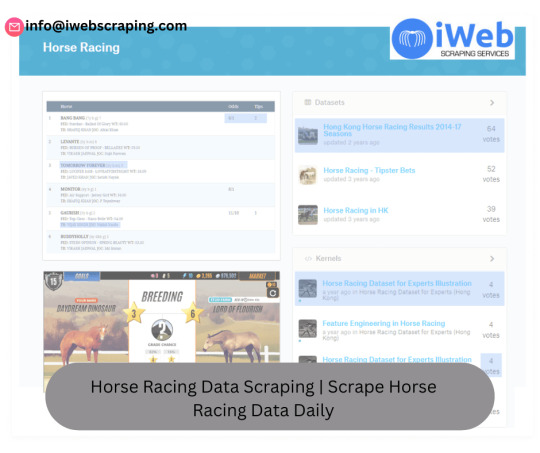
Horse racing, a sport steeped in tradition, continues to captivate audiences worldwide. Enthusiasts and bettors alike crave up-to-date information to make informed decisions. This is where horse racing data scraping comes into play. By leveraging modern technology, it's possible to scrape horse racing data daily, offering invaluable insights and a competitive edge. In this blog, we'll explore the intricacies of horse racing data scraping, its benefits, and how you can get started.
What is Horse Racing Data Scraping?
Data scraping involves extracting information from websites using automated tools. For horse racing, this means pulling data on races, horses, jockeys, track conditions, and more from various online sources. This information is then compiled into a structured format, such as a spreadsheet or database, where it can be easily analyzed.
Why Scrape Horse Racing Data?
Comprehensive Analysis: Scraping allows you to gather extensive data across multiple sources, providing a holistic view of the racing landscape. This includes historical performance, current form, and even predictive analytics.
Timeliness: Manually collecting data can be time-consuming and prone to errors. Automated scraping ensures you get the latest information daily, crucial for making timely betting decisions.
Competitive Edge: With access to detailed and up-to-date data, you can spot trends and patterns that others might miss. This can significantly improve your chances of placing successful bets.
Customization: Scraping allows you to collect data specific to your needs. Whether you're interested in particular races, horses, or statistics, you can tailor the scraping process to your preferences.
Key Data Points to Scrape
When setting up your horse racing data scraping project, focus on the following key data points:
Race Details: Date, time, location, race type, and distance.
Horse Information: Name, age, gender, breed, past performance, and current form.
Jockey Data: Name, weight, past performance, and win rates.
Trainer Statistics: Name, career statistics, recent performance, and track record.
Track Conditions: Weather, track surface, and condition ratings.
Betting Odds: Opening odds, closing odds, and fluctuations.
Tools and Techniques for Data Scraping
Python Libraries: Python offers several powerful libraries like BeautifulSoup, Scrapy, and Selenium for web scraping. BeautifulSoup is great for parsing HTML and XML documents, while Scrapy is a more robust framework for large-scale scraping projects. Selenium is useful for scraping dynamic content.
APIs: Some websites provide APIs (Application Programming Interfaces) that allow you to access their data directly. This is often a more reliable and ethical way to gather information.
Browser Extensions: Tools like Octoparse and ParseHub offer user-friendly interfaces for scraping without needing to write code. These are ideal for beginners or those who prefer a visual approach.
Database Management: Once data is scraped, tools like SQL databases or NoSQL databases (e.g., MongoDB) can help manage and analyze it effectively.
Ethical Considerations
It's important to approach data scraping ethically and legally. Here are some guidelines:
Respect Terms of Service: Always check the terms of service of the websites you plan to scrape. Some sites explicitly forbid scraping.
Rate Limiting: Avoid overwhelming a website's server with too many requests in a short period. Implement rate limiting to ensure your scraping activities don't cause disruptions.
Data Privacy: Be mindful of data privacy regulations and avoid scraping personal or sensitive information.
Getting Started
Identify Your Data Sources: Start by listing the websites and APIs that provide the data you need.
Choose Your Tools: Select the scraping tools that best fit your technical skills and project requirements.
Set Up Your Scraping Environment: Configure your development environment with the necessary libraries and tools.
Write and Test Your Scrapers: Develop your scraping scripts and test them to ensure they are extracting the correct data accurately.
Automate and Maintain: Set up automation to run your scrapers daily. Regularly monitor and update your scrapers to handle any changes in the websites' structures.
Conclusion
Horse racing data scraping offers a wealth of opportunities for enthusiasts and bettors to enhance their understanding and improve their betting strategies. By automating the data collection process, you can access timely, comprehensive, and accurate information, giving you a significant edge in the competitive world of horse racing. Whether you're a seasoned bettor or a newcomer, leveraging data scraping can take your horse racing experience to the next level.
0 notes